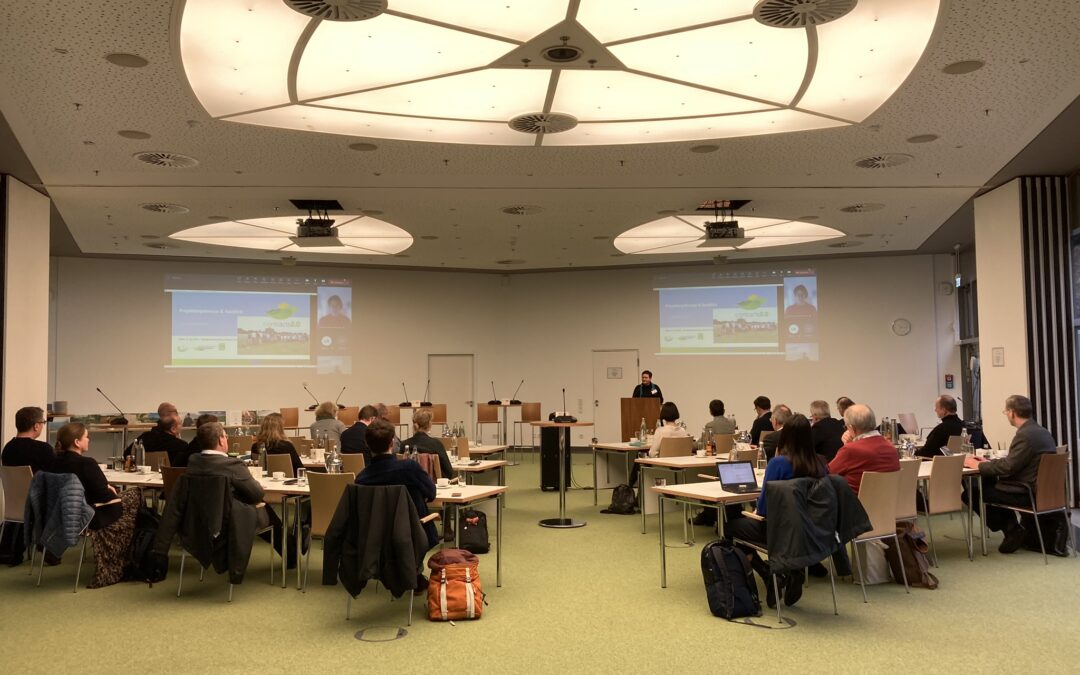On 27 January 2023, the German Farmers’ Association (DBV), the Westphalian Landscape Foundation (SWK) and the Rhenish Landscape Foundation (SRK) jointly organised the final event of the Contracta formal, written agreement for a specified duration signed by (at least) two parties. In Contracts2.0, we acknowledge the existence of informal contracts but use formal contracts to focus the research. More Innovation Lab (CIL) and Policy Innovation Lab (PIL) NRW. Among the round about 40 participants were representatives from agriculture, nature conservation and science as well as administration on regional and federal level. Held in Berlin, the event was streamed online to enable as many interested persons as possible to participate.
<< German Version below >>
The aim of the event was to promote knowledge transfer between the Contracta formal, written agreement for a specified duration signed by (at least) two parties. In Contracts2.0, we acknowledge the existence of informal contracts but use formal contracts to focus the research. More Innovation Lab (CIL) and the Policy Innovation Lab (PIL) as well as to enable a direct exchange between practitioners and political decision-makers to pave the way for a future-oriented and attractive agri-environment-climate measures. In addition to a summary of relevant contracts2.0 project results from the 2019-2023 workshops, collective approaches to implement Agri-environment-climate measures following the Dutch model were addressed from different perspectives. Speakers from multiple German federal states and the EU-Commission described their experiences with collective agri-environmental schemes and provided valuable insights into practical, political, and administrative implementation.
The discussions showed that there was an agreement that nature conservation collectives are a promising and feasible approach to future agricultural funding and support, provided it is individually adapted to the regional conditions. The introduction of a collective scheme requires courage to try something new, as well as commitment, willingness to compromise and perseverance from all involved parties on the path to conversion.
All presentations can also be found on our website (unfortunately only in German language).
————————————————————————————————————-
Abschlussveranstaltung Contracta formal, written agreement for a specified duration signed by (at least) two parties. In Contracts2.0, we acknowledge the existence of informal contracts but use formal contracts to focus the research. More und Policy Innovation Lab Nord-Rhein-Westfalen
Am 27. Januar 2023 organisierten der Deutsche Bauernverband (DBV), die Stiftung Westfälische Kulturlandschaft (SWK) und die Stiftung Rheinische Kulturlandschaft (SRK) die gemeinsame Abschlussveranstaltung von Contracta formal, written agreement for a specified duration signed by (at least) two parties. In Contracts2.0, we acknowledge the existence of informal contracts but use formal contracts to focus the research. More Innovation Lab (CIL) und Policy Innovation Lab (PIL) NRW. Unter den gut 45 Teilnehmern befanden sich Vertreter aus Landwirtschaft, Naturschutz und Wissenschaft sowie aus der Verwaltung der Regional- und Bundesebene. Die Veranstaltung in Berlin konnte zusätzlich über einen Live-Stream online verfolgt werden, um möglichst vielen Interessierten die Teilnahme zu ermöglichen.
Ziel der Veranstaltung war es, den Wissenstransfer zwischen dem Contracta formal, written agreement for a specified duration signed by (at least) two parties. In Contracts2.0, we acknowledge the existence of informal contracts but use formal contracts to focus the research. More Innovation Lab (CIL) und dem Policy Innovation Lab (PIL) zu fördern sowie einen direkten Austausch zwischen Praktikern und Entscheidungsträgern für eine zukunftsfähige und attraktive Agrarumweltförderung zu ermöglichen. Neben einer Zusammenfassung der wichtigsten contracts2.0 Projektergebnisse aus den Workshops von 2019-2023, wurden Naturschutzkooperativen nach niederländischem Modell aus unterschiedlichen Perspektiven thematisiert. Referenten aus mehreren deutschen Bundesländern sowie der EU-Kommission schilderten ihre Erfahrungen mit der kooperativen Umsetzung von Agrarumweltmaßnahmen und gewährten wertvolle Einblicke in die praktische, politische und administrative Umsetzung. In den Diskussionen herrschte Einigkeit darüber, dass die kooperativ organisierte Agrarförderung ein vielversprechender und durchaus umsetzbarer Ansatz ist, sofern er individuell an die regional vorherrschenden Gegebenheiten angepasst wird. Die Einführung erfordere Mut Neues zu wagen sowie Engagement, Kompromissbereitschaft und Durchhaltevermögen von allen Beteiligten auf dem Weg der Umstellung.
Sie interessieren sich für die Präsentationen? Alle Folien sind hier zu finden (auf Deutsch).
© Amelie Hassels, Tanja Brüggemann, Lisa Sharif


